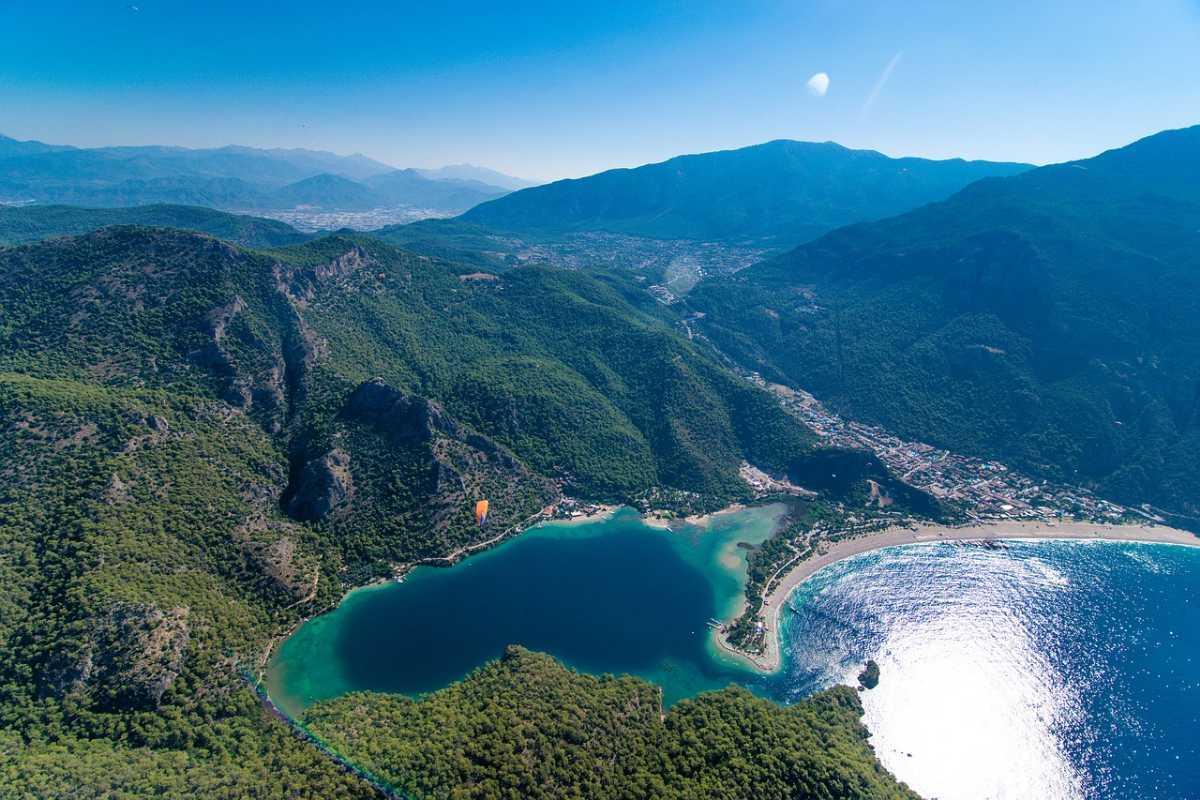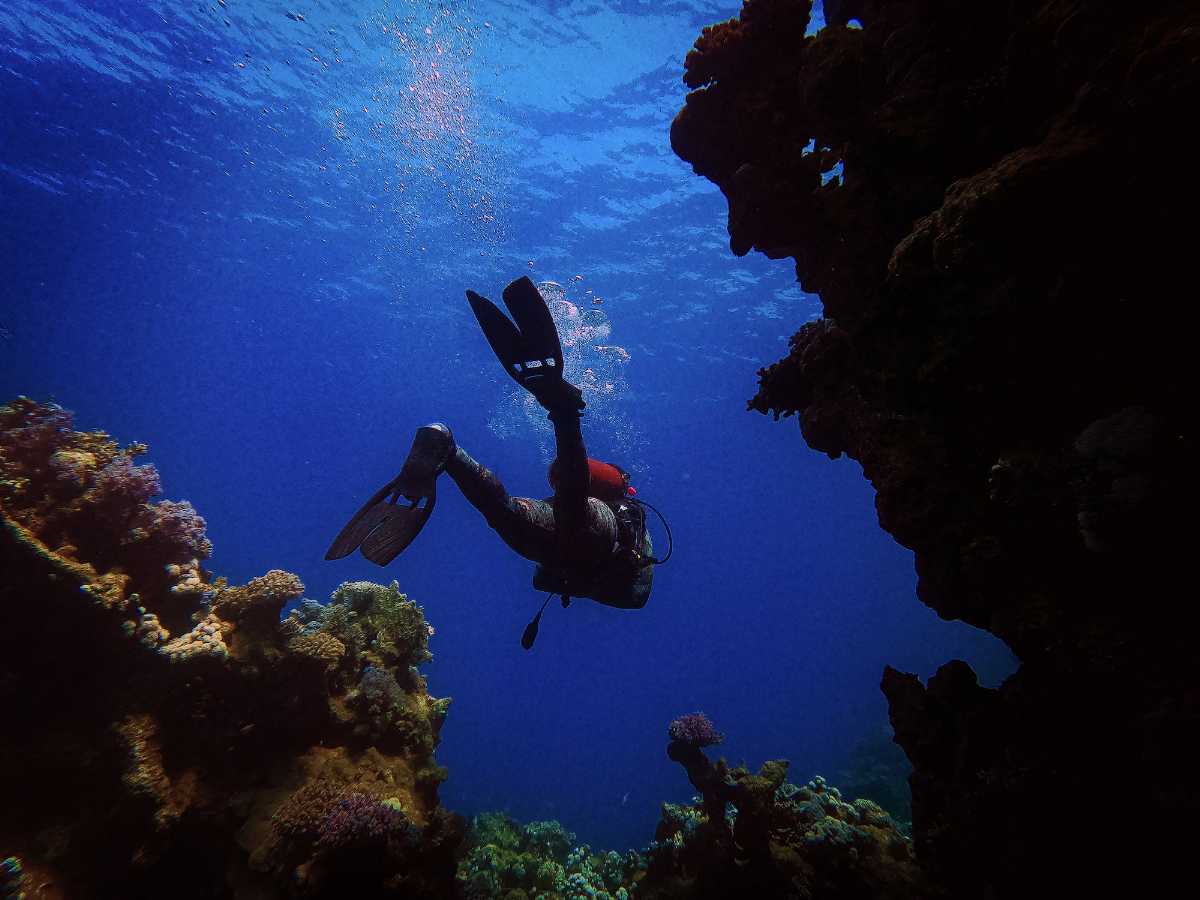Harboring the longest coastline in the world, Turkey has become an enticing destination for scuba. In Turkey, scuba diving is one of the activities one must engage in due to the enriched marine diversity to witness and the thrill it provides. From the clear waters of the Mediterranean to the historical treasures beneath the Aegean, divers can explore underwater caves, vibrant reefs, and submerged archaeological sites. The various unexplored sites give you an edge to venture into something unknown and enthralling. Here is everything you need to know about diving in Turkey.
Top 8 Diving Destinations in Turkey
1. Fethiye

Fethiye, in the Mediterranean, offers diverse diving experiences. It is combined with underwater exploration with rich marine life, ancient ruins, and clear Mediterranean waters. Butterfly Valley and the Blue Cave are among the notable sites, with opportunities to see colorful fish and underwater formations. Fethiye is an ideal destination for diving throughout the diving season, typically from April to November.
Diving Spots
Blue Lagoon (Ölüdeniz): Fethiye is near the iconic Blue Lagoon, a picturesque bay with calm, turquoise waters. Divers can explore the underwater world around the lagoon, encountering colorful fish, sea turtles, and interesting rock formations.
Butterfly Valley: Nestled between towering cliffs, it is a unique dive site known for its biodiversity. Divers can spot various fish species, octopuses, and possibly even seahorses.
Afkule Wall: A popular dive site with a vertical wall covered in colorful sponges and corals. The site is home to various marine life, including grouper, moray eels, and nudibranchs.
2. Bodrum

Bodrum is known for its historical sites and clear waters on the Aegean coast. The Aegean Sea's clear waters contribute to a vibrant and colorful underwater environment. You can also explore ancient shipwrecks, amphorae, and remnants from past civilizations and enjoy the adventurous experience.
Diving spots
Aquarium Bay: Known for its crystal-clear waters and vibrant marine life, it is suitable for divers of all levels. The site is home to colorful fish, sea cucumbers, and interesting underwater formations.
Black Island Caves: This dive site features underwater caves and tunnels, offering an adventurous experience for more advanced divers. The dark caves are adorned with marine life, creating a unique and mesmerizing environment.
Gumbet Reef: Situated in Gumbet Bay, this shallow dive site is perfect for beginners. Divers can explore the reef, encounter various fish species, and enjoy the calm, warm waters
3. Antalya

Antalya, a major coastal city on the Mediterranean, is surrounded by various dive sites. The region boasts underwater caverns, reefs, and the opportunity to see marine life like sea turtles and rays. The diving season typically runs from April to November.
Diving spots
Tunektepe Cave: This cave dive is known for its fascinating rock formations and underwater tunnels. Divers can explore the caverns and encounter marine life, such as groupers, moray eels, and various reef fish species.
Piramit Reef: A popular dive site with diverse marine species. The reef is adorned with colorful corals, and divers may spot schools of fish, octopuses, and occasionally larger species like barracudas.
Phosphorus Cave: An underwater cave with phosphorescent organisms, creating a magical and unique diving experience. The phosphorescence adds an otherworldly touch to the underwater scenery.
4. Marmaris

Marmaris, another popular destination on the Aegean coast, offers various diving locations. Sites like Paradise Island and Pineapple Bay provide rich underwater landscapes. Marmaris offers a rich array of marine life—species like fish schools, damselfish, sea breams, and barracudas. Moray eels, octopuses, and seahorses are common sightings. The diving season typically runs from April to November
Diving Spots
Grand Cavern: A captivating dive site known for its underwater caverns and rock formations. Divers can explore tunnels and swim-throughs, encountering marine life such as groupers, moray eels, and colorful sponges.
Turunc Wall: A wall dive where divers can descend along a steep underwater cliff. The site is home to various fish species, including breams and wrasses. Sea turtles are also occasionally spotted.
5. Gökova Bay

Gökova Bay, situated between Bodrum and Marmaris, is a peaceful area with clear waters. It offers a variety of diving experiences, including caves and colorful reefs. Gökova Bay is home to a rich diversity of marine life—species like schools of fish, including damselfish, sea breams, and wrasses. Moray eels, octopuses, and seahorses are common sightings.
Diving spots
Seven Islands: Gökova Bay is known for the Seven Islands, which provide a variety of dive sites. Each island offers different underwater landscapes, from walls and drop-offs to caves and canyons.
Kerevir Island: This island is famous for its underwater cave systems, offering an adventurous experience for cave diving enthusiasts. The caves are adorned with stalactites and stalagmites.
6. Kaş and Kalkan

Located on the Mediterranean coast, Kaş and Kalkan are popular diving spots. The area features crystal-clear waters, underwater caves, and a variety of marine life—species like damselfish, wrasses, and sea breams. Larger marine species, such as barracudas and groupers, are common sightings.
Diving Spots
Blue Hole (Mavi Delik): One of Kas's most renowned dive sites, the Blue Hole is a deep underwater sinkhole surrounded by steep walls. Divers can explore the depths and encounter various marine species, including groupers and schools of fish.
Flying Fish Reef: Known for its diverse marine life and underwater topography, this site features colorful coral formations, sea fans, and the chance to spot larger pelagic species.
Antalya Wrecks: Several shipwrecks near Kas attract divers seeking underwater exploration. The wrecks provide habitats for marine life, and divers may encounter sea turtles and other marine creatures.
7. Datça
Datça, situated on the Datça Peninsula, provides a quieter diving experience. The region features clear waters, underwater cliffs, and the chance to encounter different fish species.
8. Canakkale
Situated in the Aegean Sea, this region marks the commencement of the Marmara Sea. Saros Bay stands out as a self-cleansing stretch of water, boasting a wealth of marine life alongside several shipwrecks. The Lundy shipwreck, in particular, is renowned, offering sightings of turtles, dolphins, lobster, vibrant orange corals, and a myriad of fish species.
Best Time to Scuba Diving in Turkey
Scuba diving in Turkey offers a year-round experience, making it accessible regardless of the season. Water temperatures range from as low as 16°C in early February to as high as 28°C in mid-August, creating a noticeable contrast based on the time of year.
While the prime diving season spans from May to November, there are advantages to diving outside of these months. Given the popularity of scuba diving in Turkey, particularly during peak season, opting for a dive in the winter allows you to enjoy the country's dive sites in a more serene atmosphere.
Tips for Scuba Diving in Turkey
- Ensure you have the necessary scuba diving certification from a recognized agency. Many dive sites in Turkey may require proof of certification before allowing you to dive.
- Before diving, check the weather conditions, water temperature, and visibility. This information helps you prepare appropriately for the dive and ensures a safer experience.
- Select well-established and reputable dive centers with experienced instructors. Research reviews and ask for recommendations to ensure you receive quality training and guidance.
- Stay familiar with local diving regulations and rules. Some areas may have specific guidelines to protect marine life and underwater environments.
- Pay attention to pre-dive safety briefings provided by divemasters or instructors. Understand emergency procedures, hand signals, and any specific rules for the dive site.
- Proper hydration is crucial, especially in warm weather. Drink sufficient water before and after diving to prevent dehydration.
- Practice proper equalization techniques to avoid barotrauma. Equalize your ears and sinuses regularly, especially during descents.
- Respect marine life and underwater ecosystems. Avoid touching or disturbing marine creatures, and maintain a safe distance to ensure your safety and the environment's well-being.
- Dive within your certified limits and experience level. Don't attempt dives beyond your training; communicate any concerns or discomfort to your dive buddy or instructor.
- Ensure you have all necessary scuba diving gear, including a well-maintained mask, fins, regulator, BCD (buoyancy control device), and a dive computer. Check your equipment before each dive.
So this is everything that you need to know about diving in Turkey. It is one of the most fascinating experiences, but it should always be conducted safely to ensure a safe and exciting scuba diving experience.